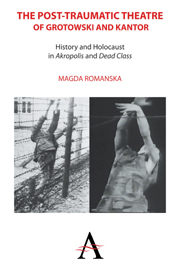 The Post-traumatic Theatre of Grotowski and Kantor
The Post-traumatic Theatre of Grotowski and Kantor from Part I - Our Auschwitz: Grotowski's Akropolis
Grotowski's relationship to the dramatic text is complicated; although he disregards the playwright's intentions, he also considers the text a framework of already-established, cultural signposts on which the director is to build his own version of the show. In Towards a Poor Theatre, Grotowski elaborates on his relationship to the classic text:
The strength of great works really consists in their catalytic effect: they open doors for us, set in motion the machinery of our self-awareness. My encounter with the text resembles my encounter with the actor and his with me. For both producer and actor, the author's text is a sort of scalpel enabling us to open ourselves, to transcend ourselves, to find what is hidden within us and to make the act of encountering the others. […] In the theatre, if you like, the text has the same function as the myth had for the poet of ancient times.
Ludwik Flaszen points out that “Grotowski took Wyspiański's drama and fashioned a montage, with fragments, scenes, and with the concentration camp. So, there was a script of sorts, although this script made no sense as a drama, because the whole structure was destroyed in it.” Thus, the outline of Wyspiański's drama serves as a departure point for skewed transpositions of themes, symbols and metaphors.
To save this book to your Kindle, first ensure [email protected] is added to your Approved Personal Document E-mail List under your Personal Document Settings on the Manage Your Content and Devices page of your Amazon account. Then enter the ‘name’ part of your Kindle email address below. Find out more about saving to your Kindle.
Note you can select to save to either the @free.kindle.com or @kindle.com variations. ‘@free.kindle.com’ emails are free but can only be saved to your device when it is connected to wi-fi. ‘@kindle.com’ emails can be delivered even when you are not connected to wi-fi, but note that service fees apply.
Find out more about the Kindle Personal Document Service.
To save content items to your account, please confirm that you agree to abide by our usage policies. If this is the first time you use this feature, you will be asked to authorise Cambridge Core to connect with your account. Find out more about saving content to Dropbox.
To save content items to your account, please confirm that you agree to abide by our usage policies. If this is the first time you use this feature, you will be asked to authorise Cambridge Core to connect with your account. Find out more about saving content to Google Drive.